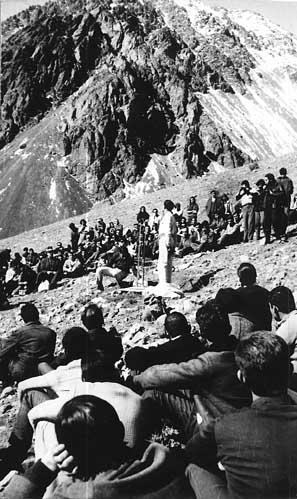On May 4th 1969 Silo, also known as “The Sage of the Andes”, spoke to a group of about 200 people who had arrived to Punta de Vacas, a remote outpost at the foothills of Mount Aconcagua near the border between Argentina and Chile. He had been forced to speak there by the military government ruling Argentina at the time as he was not allowed to do it in the city. “Go speak to the stones” they said. But people arrived to listen to him in spite of the hurdles and threats imposed by the local armed forces that surrounded the place whilst he spoke.
What better evidence could there be for the absolute need for his message of peace and nonviolence? But he also warned of increasing violence in the future, at a time when things did not look so desperate. Man on the moon and the increasing students mobilisations, somehow it was a hopeful time. The system, however, changed, became more violent and more dehumanised. The economic forces kept at bay by the Bretton Woods agreement and the institutions created to enforce them careered out of control in the ’70s in neoliberal orgy of concentration of wealth and resources, taken by the hand by “the Markets”, sawing as they run wars, poverty, discrimination and spiritual emptiness.
So, 45 years later, here are the final word of that momentous speech, “The Healing of Suffering” the basis for a new current of thought launched towards the creation of the Universal Human Nation, a nonviolent society where diversity is celebrated so that it can joyfully converge in a common human project of growing meaning.
“…Spurred by desire, the violence in a person does not simply remain like a sickness in the consciousness of that person—it acts in the world of other people and is exercised upon them. And do not think that when I talk of violence I am speaking only about the armed act of war, where some men destroy others. That is only one form of physical violence.
There is also economic violence. Economic violence is the violence through which you exploit other people; economic violence occurs when you steal from another, when you are no longer a brother or sister to others but a bird of prey feeding upon them.
There is also racial violence. Or do you think that you are not being violent when you persecute someone because that person is not of your own race? Do you think that you are not engaging in violence when you malign that person for being of a race different from your own?
And there is religious violence: Do you think that you are not engaging in violence when you refuse work to, close your doors to, or dismiss a person, because that person does not share your religious beliefs? Do you believe that it is not violence when you use words of hate to build walls around other people, excluding them from your society, because they do not share your religious beliefs—isolating them within their families, segregating them and their loved ones, because they do not share your religion?
There are other forms of violence that are imposed by the Philistine morality. You wish to impose your way of life upon another; you wish to impose your vocation upon another. But who has told you that you are an example that must be followed? Who has told you that you can impose a way of life because it pleases you? What makes your way of life a model, a pattern that you have the right to impose on others? This is another form of violence.
Only inner faith and inner meditation can end the violence in you, in others, and in the world around you. All the other doors are false and do not lead away from this violence. This world is on the verge of exploding with no way to end the violence! Do not choose false doors. There are no politics that can solve this mad urge for violence.
There is no political party or movement on the planet that can end the violence. Do not choose false doors that promise to lead away from the violence in the world . . . I have heard that all over the world young people are turning to false doors to try to escape the violence and inner suffering. They turn to drugs as a solution. Do not choose false doors to try to end the violence.
My brother, my sister—keep these simple commandments, as simple as these rocks, this snow, and this sun that bless us. Carry peace within you, and carry it to others. My brother, my sister—if you look back in history, you will see the human being bearing the face of suffering. Remember, even as you gaze at that suffering face, that it is necessary to move forward, and it is necessary to learn to laugh, and it is necessary to learn to love.
To you, my brother and sister, I cast this hope—this hope of joy, this hope of love—so that you elevate your heart and elevate your spirit, and so that you do not forget to elevate your body.”










